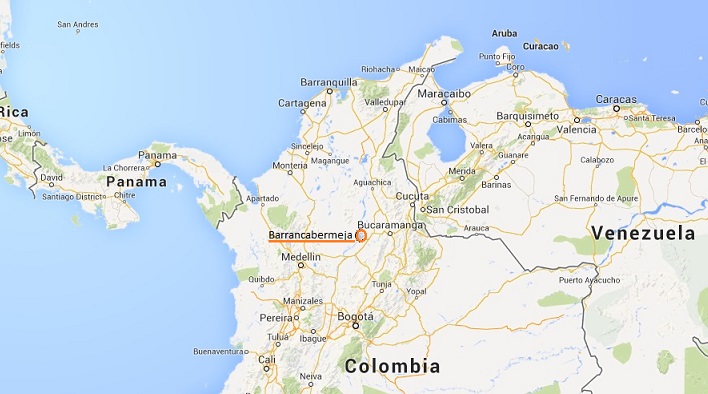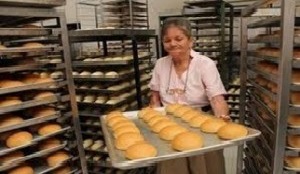The Erasmus Mundus social economy project is delighted to present the first in a series of articles written by students from the Universidad Pontificia Bolivariana, Bucaramanga, Colombia. The students of social communication and journalism have researched organisations working in the social and solidarity economy within their locality and have written reports on their findings. This is the fruit of their collaboration with York St John University, UK, within the project.
An example of perseverance and enterprise
Article researched and written by Lina Fernanda Muñoz González, Universidad Pontificia Bolivariana, Colombia
Translated from Spanish to English by Charles Hanks, collaborator in the social economy project, UK
The families of Versalles in Barrancabermeja are living proof that dreams can indeed be realised. Enduring the constant nightmare of the era of violence in Colombia, only solidarity, perseverance, enterprise and a wish for peace could transform this nightmare into a dream to be made a reality.

Colombia, a magnificent country rich in natural resources, has suffered the violence of an armed conflict for a long time; this has not been, however, reason enough for Colombians to abandon hope. They are keen to move forward.
One proof of this began in 1992, in a very poor area of the northern city of Barrancabermeja called Versalles, designated a ‘red zone’, an area where there is constant conflict. Here was a community that was a victim of the war and its consequences. Its population lived in a state of uncertainty and extreme poverty, with not enough to eat: even the market did not make it to the area due to the constant gun-fights and shootings.
And more and more young people were taking part in the conflicts, giving rise to more violence and poor education. In response to these circumstances which the families of Versalles faced daily, a handful of women decided to meet to discuss their considerable fears about the situation and how it could not continue in the same way. These women decided to look for solutions to their economic and social problems.
Together, they found an extraordinary way of resolving the problem of the family ‘food basket’; in a show of solidarity, 11 families each managed to contribute $200 Columbian pesos (approx. 0.1 US dollar and 3.5% of the legal minimum wage at the time) towards setting up a market, ensuring that every household’s food needs were met.
In time, they began to realise that this idea had gone a long way to improving their lives so decided to continue, but this time in a more organised fashion. Seeing that through working as a team – as they had been doing – they really were achieving great things, they decided to officially define themselves as a group working for the good of all, with the objective of developing their community.
Years later, they became established as the ‘Asociación de Desarrollo Comunitario Merquemos Juntos’ (‘Market Together Community Development Association’). The women went out every day at 3am to set up the market in the Torcoroma market place, not letting anything get in their way, even the war that was taking place all around them.
With the support of Antonio Gómez, the local priest at the time and part of Fundación Compartir (The Sharing Foundation), the project became a space for combating violence.
Needing to keep the family ‘food basket’ project going, they created a revolving fund offering low-interest loans to cover the community’s needs. “When a problem is widespread and concerns everyone, we go looking for a solution and other programmes are set up, such as the revolving fund, which today we call ‘solidarity economy’ but was to prevent women having to go to the pawnbroker with their iron or the electric fan or whatever little else they had, and losing it because they had no way of getting it back. This led to the bingo night that was organised, in which 36 families took part,” says Lucía García, treasurer of Merquemos Juntos.
“That bingo was a success. We made $186,000 pesos (approx. 100 US dollars), so more or less $5,000 pesos (approx. 2.5 US dollars) per member that took part, but nobody took a single peso. It was all kept in a central account, and in a notebook we opened like an account for each member; with that money we started to give loans to these women to buy medicine for their children, to pay bills, or for whatever other difficulty they had,” García explains.
Growing steadily, with 46 families linked to the project by now, they were beginning to need new ways of organising the group, and thanks to such perseverance they managed to build a solidarity economy fund, to help alleviate domestic hardship, in health, education, construction and improving their quality of life.
There are more and more families associated with Merquemos Juntos, which has turned out to be an example for all those who believe that violence puts an end to hope, showing that there are ways to deal with it and this is one of them.
Eager to keep moving forward, they have decided to undertake another project. Employing the knowledge of certain members, the help of others and the desire to learn of yet others, they have opened a bakery, continuing their successful drive for food sustainability. They have also obtained a juice and dairy processor, furthering their work for the family ‘food basket’.
With solidarity being one of their principal values, Merquemos Juntos is today a real enterprise association which has worked for years to improve quality of life in every way necessary. As testament to their constant fight and their development, they have been awarded various acknowledgements of their work: The Model Colombian Prize, 2000; The Comprehensive Human Rights award in France, also in 2000; the Yarigui order of merit for Guillermina Hernández, leader of the association; the IESO prize at the Universidad de los Andes in 2002; the Woman Entrepreneur award in 2005; and the National Peace Prize in 2011 – this last perhaps the most important of all as it is recognition of the work of Merquemos Juntos in bringing peace to Colombia.
Projects such as the community market, child benefits, support for further study, creation of jobs, micro-credit, the bakery and the food processor have contributed to the objectives of overcoming poverty, of removing young people from the war, of seeking peace, and of personal development.
“The association, for me, is a door, a window onto hope. And hope is what we have devoted our lives to,” Lucía García affirms.
